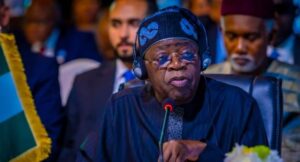President Bola Ahmed Tinubu recently spoke to African leaders about the progress and challenges of ECOWAS, the West African economic bloc. In his address in Accra, Ghana, Tinubu, who serves as the Chairman of ECOWAS, emphasized the group’s commitment to maintaining unity and addressing regional issues through dialogue.

ECOWAS plans to engage in discussions with Burkina Faso, Mali, and Niger to ensure regional cohesion and will soon hold a Special Extra-ordinary Summit to discuss the future of the bloc. During the Sixth Mid-Year Coordination Meeting of the African Union, Tinubu shared ECOWAS’s achievements over the past year, including the activation of a Standby Force to combat terrorism and efforts to secure funding for various initiatives.
The President highlighted ECOWAS’s role in supporting electoral and governance processes in member states, noting recent peaceful and fair elections in Senegal and Togo. He also mentioned the successful facilitation of a National Unity Agreement in Sierra Leone and ongoing efforts to implement its provisions.
Tinubu acknowledged the significant threats facing ECOWAS, such as member state withdrawals, geopolitical rivalries, terrorism, food insecurity, climate change, and the spread of misinformation. To address these challenges, ECOWAS is revising its 2001 Supplementary Protocol on Democracy and Good Governance.
The economic bloc has made strides in consolidating a free trade area, customs union, and common market. Six member states have ratified the WTO Fisheries Subsidies Agreement, and thirteen have ratified the AFCFTA agreement. Additionally, the ECOWAS interconnected System for the Management of Goods in Transit (SIGMAT) is operational in twelve member states.
On the humanitarian front, ECOWAS has allocated $9 million to support refugees, internally displaced persons, and asylum seekers. The fight against terrorism has been bolstered with $4 million for the ECOWAS Counter Terrorism Humanitarian Response.
In education, ECOWAS has established the West African Network of National Academies of Sciences and the African Forum for Research and Innovation. The regional Academic Mobility Scheme aims to equip youth with practical skills and harmonize education systems. In health, ECOWAS supports women with obstetric fistula, empowers women entrepreneurs in agribusiness, and promotes gender equality in education and the green economy.




